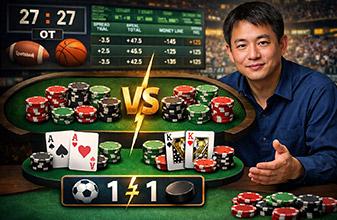Sports Betting Basics

King Yao is the author of Weighing the Odds in Hold‘em Poker, and Weighing the Odds in Sports Betting. He uses his experience from making millions in financial derivative markets and translates it into gambling. Since he left his trading position in 2000, he has been playing poker and betting on sports. He travels to Las Vegas frequently, especially during football season.
Let’s discuss a basic principle of sports betting. All sports bettors should know the information below. All other types of casino advantage players, including blackjack players of all skill sets, including card counters, should have good working knowledge of Expected Value as well.
You should not be betting online or anywhere else without this fundamental knowledge.
Expected Value (EV)
You are in the supermarket shopping for bread. You see two brands that you like equally, but one is cheaper. You decide to buy the cheaper one. You have just made a decision by comparing the expected value of the two brands of bread.
You are driving on a highway during rush hour. Your lane seems to be going slower than the lane to your left. The first chance you get, you switch over to the left lane so you can get home faster. You have just made a decision based on the comparison of the expected value of the two lanes.
You are at the sportsbook watching a game and the first half just ended. One team is playing without emotion and you think that will be the cause of their downfall in the second half. You decide to make a second half bet against the emotionless team based on your gut feeling. Right or wrong, you have just made a decision based on the perceived expected value of the teams.
Expected value is a concept that all people use in their daily lives, sometimes without being conscious of it. Whenever there is a choice, expected value can be useful in making a decision. Sometimes the values are not purely monetary. The value could be based on happiness, a term that academics like to call utility.
Although often there is no need to use a formula to calculate the expected value of a decision, there are cases where a calculation gives a result that is counterintuitive, or shows why an idea is correct or incorrect. It can also help to pinpoint factors to consider in sports betting.
Expected value (EV) describes the value of an event averaged over all possible outcomes. It is a way to describe situations that can have different results. Consider a basketball player at the free throw line. If Player A has made 750 free throws out of 1,000 attempts, a fair estimation of his chance of making his next free throw is 75%. The EV of the number of points scored with one free throw attempt is 0.75. Player A either makes the free throw and scores one point or misses the free throw and scores no points; but on average, with one free throw, he is expected to score 0.75 points.
Calculating EV
To calculate the EV of an event, take all possible outcomes and assign each of them a monetary result and a probability. The sum of the probabilities equals 100%. The sum of the individual results, each multiplied by its probability, equals the EV of that event. If the EV of the event is a positive number, the event has a positive expectation or positive EV. If the EV of the event is a negative number, the event has a negative expectation or negative EV.
Here is an example with a roll of a single die. You roll a fair die, and each of the six faces has an equal chance of coming up. If the die comes up 1 through 4, you win $3. If the die comes up 5 or 6, you lose $3. Below are the probabilities of each roll and the results.
Face Prob. Result Prob. x Result
1 1/6 + $3 + $0.50
2 1/6 + $3 + $0.50
3 1/6 + $3 + $0.50
4 1/6 + $3 + $0.50
5 1/6 - $3 - $0.50
6 1/6 - $3 - $0.50
Total 6/6 N/A + $1.00
The last column shows the multiplication of the Probability and the Result columns. Add all the numbers in that column to get the result, the EV of a roll: +$1. You expect to make $1 per roll of the die. But you will not win $1 on any given roll; you will either win $3 or lose $3.
This is part of an occasional series of articles.
Excerpted with permission from the e-book version of Weighing the Odds in Sports Betting by King Yao, edited for this format.











Please log in or register to leave a comment